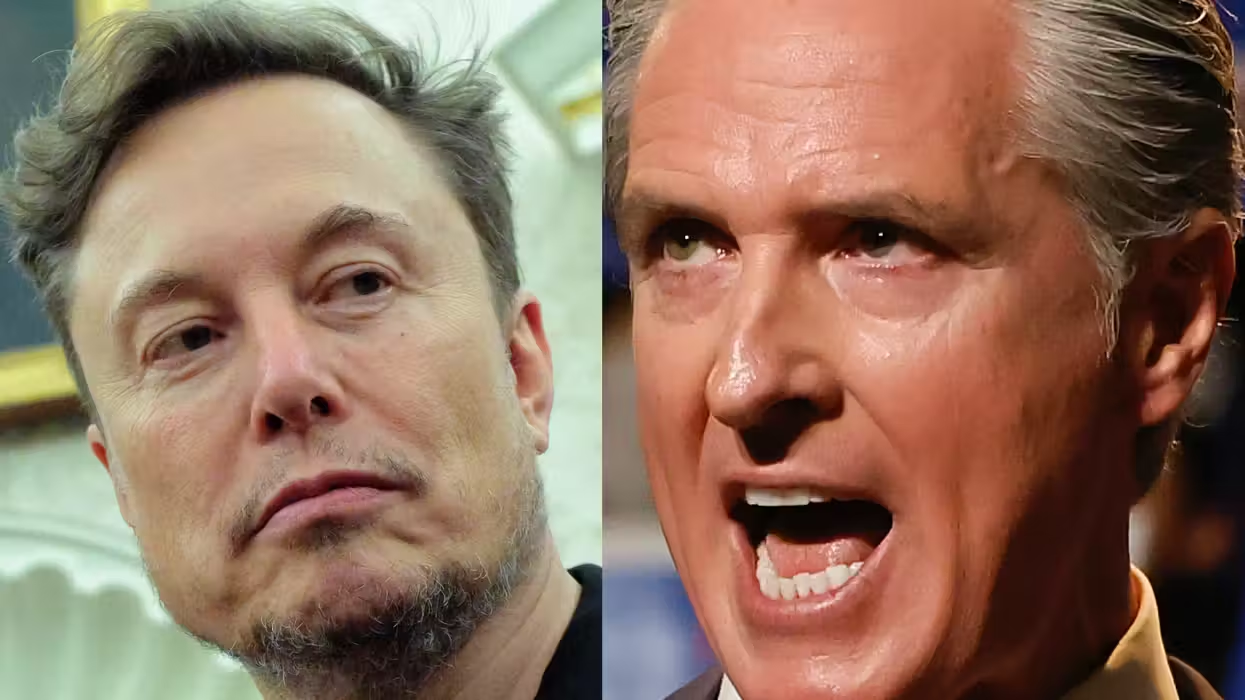The Washington Post faulted several Democratic lawmakers for less-than-truthful assertions about the Supreme Court's ruling in the Hobby Lobby case, most of which implied that employers could prevent employees from buying contraception.
 Senate Majority Leader Senator Harry Reid (D-Nev.) and House Minority Leader Nancy Pelosi (D-Calif.) each made misleading statements in the wake of the Supreme Court's Hobby Lobby ruling. (Brendan Smialowski/AFP/Getty Images)
Senate Majority Leader Senator Harry Reid (D-Nev.) and House Minority Leader Nancy Pelosi (D-Calif.) each made misleading statements in the wake of the Supreme Court's Hobby Lobby ruling. (Brendan Smialowski/AFP/Getty Images)
The 5-4 court majority actually ruled that closely held companies cannot be forced to pay for select types of contraceptives for employees.
Since some Democrats – including party leaders Sen. Harry Reid of Nevada and Rep. Nancy Pelosi of California – confessed to misspeaking, and others stated they were expressing an opinion, the Post's Fact Checker said it would not count the comments as outright lies.
“But this collection of rhetoric suggests that Democrats need to be more careful in their language about the ruling,” the Post noted. “All too often, lawmakers leap to conclusions that are not warranted by the facts at hand. Simply put, the court ruling does not outlaw contraceptives, does not allow bosses to prevent women from seeking birth control and does not take away a person’s religious freedom.”
The Post cited eight Democrats for making misleading comments:
1. House Minority Leader Nancy Pelosi (D-Calif.): “Really, we should be afraid of this court. The five guys who start determining what contraceptions are legal. Let’s not even go there.”
The majority opinion written by Justice Samuel Alito said, “under our cases, women (and men) have a constitutional right to obtain contraceptives,” and cited the 1965 ruling in Griswold v. Connecticut that struck down state laws banning contraceptives.
Pelosi spokesman Drew Hammill told the Post his boss “misspoke.”
“Obviously the impact of the court’s decision is not to make these four contraceptive methods illegal – i.e. no longer allowed to be sold”, he said. “But the overriding point here is that the decision does in fact limit access, which is the key point Pelosi made.”
PolitiFact gave Pelosi a “false” rating, for which the Post said, “we certainly agree, though we generally do not award Pinocchios when politicians fess up to a mistake.”
2. Senate Majority Leader Harry Reid (D-Nev.): “The one thing we are going to do during this work period, sooner rather than later, is to ensure that women’s lives are not determined by virtue of five white men. This Hobby Lobby decision is outrageous, and we are going to do something about it.”
Here, the Post referenced the now widely reported Reid gaffe, and pointed out Justice Clarence Thomas is not a white male.
“That was a mistake, and he knew it right away,” Reid spokesman Adam Jentleson told the newspaper. He added that on other occasions, Reid said “five men.”
Pelosi and Reid were the only Democrats whose representatives didn't dig in on their misrepresentations.
3. Democratic National Committee Chairwoman Rep. Debbie Wasserman Schultz (D-Fla.): “This is deeply troubling because you have organized religions that oppose health care, period. So if you have an employer who is a member of an organized religion and they decide, you know, I wouldn’t provide health care to my own family because I object religiously, I’m not going to allow any kind of health care treatment.”
The Post said that “Wasserman Schultz goes to quite an extreme to suggest that employers could block an employee from seeking any kind of health-care treatment. (Again, the issue was who would pay for contraceptives, not whether someone was barred from getting contraceptives.)”
“The Chair was referring to the Justice’s ruling which puts employers’ religious beliefs ahead of the medical needs of employees,” DNC spokesman Michael Czin said. “We fundamentally disagree with the logic behind that ruling.”
4. Senate Majority Whip Dick Durbin (D-Ill.): “[In Griswold v. Connecticut,] the Supreme Court said that the right of privacy of individuals and families trumped any state right to ban contraceptives. It was a breakthrough. They found privacy, at least the inference of privacy, in the Constitution. I asked that question repeatedly of Justice Roberts and Justice Alito to make sure that they would honor that same tradition of privacy. The Hobby lobby decision violates that fundamental premise. [While both justices were careful in their answers before confirmation,] they both said they stood by the Griswold decision.”
A Durbin spokeswoman who asked that the Post not to used her name said the senator "was saying Hobby Lobby was out of line with the general ‘tradition of privacy’ that permitted women to make their own choices about birth control."
“He was critiquing this ruling and its impact on women’s access to contraceptive coverage, not making a prediction about future cases," she said.
5. Sen. Mark Udall (D-Colo.): “The U.S. Supreme Court’s Hobby Lobby decision opened the door to unprecedented corporate intrusion into our private lives. Coloradans understand that women should never have to ask their bosses for a permission slip to access common forms of birth control.”
The Post noted: “Again, the issue is not whether women will have access to birth control, but whether the health plan will cover the cost.”
“Following the court’s decision, women will need to effectively ask their employers if they will continue to cover contraception,” Udall spokesman Mike Saccone told the newspaper. “They will need to determine if their boss will give permission for their insurance plans to cover birth control.”
6. Sen. Jon Tester (D-Mont.): “Before the Hobby Lobby decision, the fight against corporate influence was mainly about making sure real people and their ideas were in charge of elections. But now it is no longer just about a democracy; it is about keeping corporations out of our private lives, out of our bedrooms, and out of our religious decisions.”
Tester spokesman Dan Malessa doubled down.
“If an employer doesn’t cover contraceptive care, for many women access to birth control is effectively blocked because it becomes cost-prohibitive,” Malessa said. “If an employer refuses to cover contraceptives based on its religious views, then its religious views trump the religious views of its employees.”
7. Rep. Gwen Moore (D-Wisc.): “You know, what I am objecting to is that these bosses should not be able to tell their employees that they cannot use birth control. Motherhood is not a hobby. That is what I am objecting to.”
The Post, repeated its admonishment: “No boss under this ruling has the right to tell an employee that they cannot use birth control. That’s simply wrong, but Moore’s spokeswoman argued this is open to interpretation.”
“Congresswoman Moore was referring to the Supreme Court decision that now allows certain employers to deny contraceptive coverage to their employees through employer-sponsored health care plans,” Moore spokeswoman Staci Cox said. “By denying this coverage to their employees, many workers may not have the financial means to access this health care necessity. To your point on the Hobby Lobby decision concerning only certain forms of contraceptive coverage, the congresswoman would argue that the ruling opens the door for employers to challenge other vital health-care coverage, not limited to the four contraceptives you mentioned.”
8. Rep. Louise Slaughter (D-N.Y.): “What they’ve done, Chris [Matthews], is taken away the religious freedom of their employees. They have to comply with the religious freedom of their employers.”
“By forcing an employee to live with the religious choices imposed on them by their employer, the employee’s own religious freedom is infringed upon,” Slaughter spokesman Eric Walker said. “I think it’s fair to say that ‘freedom from religion’ goes hand in hand with ‘religious freedom.’ The first amendment protects Americans from having religion thrust upon them by others — a standard the court failed to uphold, in the congresswoman’s opinion.”
—
Follow Fred Lucas (@FredVLucas3) on Twitter

 Senate Majority Leader Senator Harry Reid (D-Nev.) and House Minority Leader Nancy Pelosi (D-Calif.) each made misleading statements in the wake of the Supreme Court's Hobby Lobby ruling. (Brendan Smialowski/AFP/Getty Images)
Senate Majority Leader Senator Harry Reid (D-Nev.) and House Minority Leader Nancy Pelosi (D-Calif.) each made misleading statements in the wake of the Supreme Court's Hobby Lobby ruling. (Brendan Smialowski/AFP/Getty Images)






